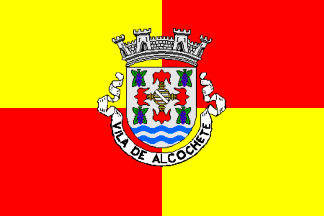Alcochete Municipality (Portugal) (original) (raw)

This page is part of © FOTW Flags Of The World website
Last modified: 2014-06-29 by klaus-michael schneider
Keywords: alcochete | [coat of arms (cross)](keywordc.html#coat of arms %28cross%29) | [cross: avis](keywordc.html#cross: avis) | [armillary sphere](keyworda.html#armillary sphere) | [grapes: 4 (purple)](keywordg.html#grapes: 4 %28purple%29) |
Links: FOTW homepage |search | disclaimer and copyright | write us | mirrors

image by Jorge Candeias, 07 Jul 1999
- About the flag
- Version without the coat of arms
- Presentation of Alcochete ACH See also:
- Communes of Alcochete
- Municipalities of Portugal
- Portugal External links:
- Page about the municipal flag and coat of arms of Alcochete at Sérgio Horta’s website (in Portuguese).
reported by Jorge Candeias, 29 Feb 1999 - Page about Alcochete at the Portuguese Municipalities’s Association website (incl. image of the arms)
reported by António Martins, 18 Nov 2001
About the flag
The Alcochete flag is an ordinary townflag: a quartered flag of yellow over red with the arms in the center. The coat of arms has a silver 4-towered mural crown, a scroll with "VILA DE ALCOCHETE" written in black, and a silver shield charged with four alternating blue and silver wavy stripes below, a red cross of Avis above, charged with a golden armilla with some devices attached that I cannot identify, and surrounded by four vines of “red” grapes (blue-violet with green leaves).
Jorge Candeias, 18 Apr 1998
Guessing the meaning of the charges in the arms, I’d say that the wavy lines stand for the river Tejo, the cross of Avis is a reflection of the primitive owners of the territory after it’s conquest to the moors, the order of Avis, and the grapes are symbols of agricultural richness and of the wines of Alcochete.
Jorge Candeias, 18 Apr 1998
Version without the coat of arms

image by António Martins, 2010
Yellow and red, quarterly.
Jorge Candeias, 07 Jul 1999
Presentation of Alcochete
Alcochete is a town placed near Lisbon. The municipality belongs to the district of Setúbal, old province of Estremadura, has 94 sq km of area and 10 050 inhabitants. If the regions go forward, it will be part of the region of Lisboa and Setúbal. It is mostly a rural area, placed in the east of the estuary of river Tejo. In it’s territory is placed part of one of the most environmentally important wet zones in Europe.
Jorge Candeias, 18 Apr 1998
It is divided in three communes.
António Martins, 2010
Anything below this line was not added by the editor of this page.